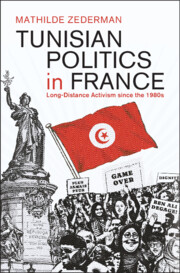Book contents
- Tunisian Politics in France
- Cambridge Middle East Studies
- Tunisian Politics in France
- Copyright page
- Contents
- Figures
- Acknowledgements
- Notes on Translation and Transliteration
- Chronology of Key Events
- Abbreviations
- 1 Introduction
- 2 Tunisian Politics in France
- 3 Constraints and Opportunities for Long-Distance Tunisian Activism
- 4 Anti-Ben Ali Politics from Afar
- 5 Anti-Regime Struggles and Immigrant Politics
- 6 Cross-Ideological Alliances and Entre-Soi
- 7 Conclusion
- Postscript
- Bibliography
- Index
- Series page
4 - Anti-Ben Ali Politics from Afar
Repertoires of Action and Frames of Human Rights
Published online by Cambridge University Press: 24 October 2024
- Tunisian Politics in France
- Cambridge Middle East Studies
- Tunisian Politics in France
- Copyright page
- Contents
- Figures
- Acknowledgements
- Notes on Translation and Transliteration
- Chronology of Key Events
- Abbreviations
- 1 Introduction
- 2 Tunisian Politics in France
- 3 Constraints and Opportunities for Long-Distance Tunisian Activism
- 4 Anti-Ben Ali Politics from Afar
- 5 Anti-Regime Struggles and Immigrant Politics
- 6 Cross-Ideological Alliances and Entre-Soi
- 7 Conclusion
- Postscript
- Bibliography
- Index
- Series page
Summary
Chapter 4 explores the nature of anti-Ben Ali politics from afar. It focusses on the field of homeland politics by investigating the modalities, frames and repertoires of action used by activists who fought the authoritarian regime. The chapter highlights the ambivalent logic underlying the use of human rights, which became the main frame of contention for the various actors. For pro-regime actors, the human rights frame was paradoxically a way of legitimising the regime abroad; for Islamists, the activation of a discourse on human rights appeared as a way of circumventing the distrust to which they were habitually subjected in France; and for leftists, human rights stood as a rallying point, because fighting the Ben Ali regime during this period meant embracing the Islamists as a matter of necessity, as they were main victims of repression. The chapter goes on to investigate two further lines of cleavage that are crucial to the full understanding of long-distance Tunisian opposition politics. These lines offer a framework that determined means of action in terms of relationships with the Islamists and the degree of rupture with the Tunisian authoritarian regime.
- Type
- Chapter
- Information
- Tunisian Politics in FranceLong-Distance Activism since the 1980s, pp. 81 - 110Publisher: Cambridge University PressPrint publication year: 2024

